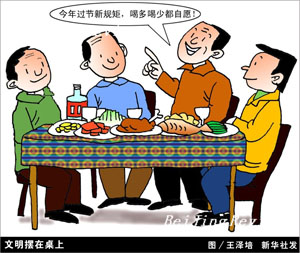
Where I come from drinking is a way of life. Around the braai (barbeque) watching sport, at the pool in fact any occasion is a good enough excuse to down a few frosties and have a rip. Often, drinking back home does not include any food, apart from the odd peanuts or crisps. It develops from youth into the rowdy binges that end in skull splitting hangovers, car accidents and alcoholism.
Drinking in China has traditionally been an altogether different affair. Most drinking is done at the dinner or lunch table. You drink, but you eat in tandem. Sensible, no doubt. Food does absorb the alcohol and save that stomach lining from a pounding.
Apart from the regulatory host getting plastered at formal banquets and having to be escorted to his car-and the endless rapid gulping at obligatory ganbei (toasts), drunks are not a common sight on Chinese streets. Well, certainly not streets that I walk on.
In fact, I didn’t think that alcoholism was an issue at all in China. People drink at meal times, down the odd baijiou or 10, drop a few Tsingtaos and go home. Maybe the scene will repeat itself the following weekend. It’s all harmless fun. Or is it?
It was therefore interesting to see the recent comments made by one of China’s top psychiatrists. He said that the country’s searing economic boom and galloping influx of Westernized trends have given rise to a major increase in alcohol abuse over the last 20 years,
Wei Hao, of China’s Central South University, told the World Congress on Alcohol Research in Sydney in September, that evidence had emerged of a striking increase in drinking and related health problems in China.
An Associated Press report quotes Wei as saying: “Economic development is the most important factor that has contributed to the increase in alcoholic consumption in China.” He was speaking after having undertaken a World Health Organization-sponsored study of the problem.
What emerged made interesting reading and points to the fact that China does indeed seem to be taking one too many tipples, and it is starting to impact on the nation’s health.
China’s brewing industry dates back further than any other. Newscientist.com says solid evidence backing this fact was found in 2004, when a Chinese-American team discovered traces of alcoholic drinks on pottery dating back as far as 7000 B.C. Moderate drinking throughout this long history has been a hallmark of the nation, but in the past two decades Wei’s study found that there has been a 10 percent rise in the rate of alcohol consumption.
“Twenty years ago people were generally very poor, so they didn’t have enough money to buy food and even clothing. Now people have become richer and richer, they have extra money to buy (alcoholic) beverages,” he said.
Wei’s study involved almost 27,000 people in China. It shows that 6.7 percent of Chinese men over the age of 15 are dependent on alcohol. That’s over 30 million people. The report said only 0.2 percent of women were similarly affected. He calculated the Chinese consumption equated to 5 liters per capita a year of pure alcohol.
And with this demand has come the need to increase alcoholic beverage production by 10 percent a year. Wei said this had a ripple effect, as the desire for alcohol had resulted in a gradual increase in drinking related illnesses. These included cirrhosis of the liver and ulcers, along with psychiatric disorders such as alcohol dependency and dementia, he said.
Wei’s report was critical of the scant attention given to public health strategies, despite the increasing documented evidence of rising alcohol abuse. “We only talk about the disorders—not the prevention,” said Wei. There are currently no hospitals dealing with alcohol related health problems in China, but the psychiatrist is confident that his report will help change that.
He points a finger at youth watching and following the lead of their Western counterparts, who more often than not drink alcohol without eating. This says Wei, is breaking down the traditional Chinese emphasis on moderate drinking accompanied by some kind of substantial meal.
And with all the business being conducted around the economic boom, it’s forcing another kind of cultural change. “In business, alcohol can be used to improve the relationship—so it forces you to drink a lot,” Wei said. Anyone who’s been on the receiving end of chasing down a business deal will attest to this.
With more cars even more new drivers on the roads, Wei’s survey also looks at this dangerous consequence of drinking, finding that driving under the influence is now the third top cause of traffic accidents in China.
Whether this is all a case of another “negative” Western influence on Chinese culture, or the inevitable spin of the wheel of progress is debatable. And perhaps those two are not mutually exclusive. Or are they?
The author is a South African living in Beijing.
| 